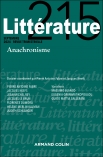
LITTÉRATURE Nº212 (4/2023)
Pour acheter ce numéro, contactez-nous
Recevez les numéros de l'année en cours et accédez à l'intégralité des articles en ligne.
En 1909, Péguy dénonce un repli collectif, qui se trouve coïncider avec son entrée dans l’âge où il aspire à embrasser sa vocation d’écrivain. Or il écrit aussi au seuil du basculement dans l’ère des catastrophes historiques. Péguy n’a guère écrit de témoignages au sens strict, mais ses Cahiers et son oeuvre même accueillent tous les enjeux (religieux, juridiques, épistémiques) du rapport de ce genre à la question de son historicité. C’est pourquoi il se situe au point de cristallisation du témoignage comme genre, en contribuant à penser la restitution d’une vérité vécue dont se porte garant un sujet par sa parole et son écriture.
In 1909, Péguy spoke out against a collective withdrawal at a time when he personally started to embrace his vocation as a writer. But he was also writing on the threshold of a new era that will be marked by historical catastrophes. Péguy hardly ever wrote testimonies in the strict sense of the term, but his Cahiers and his work itself embrace all the issues (religious, legal, epistemic) at stake in this genre’s relationship to the issue of historicity. This is why he stands at the crystallization point of testimony as a genre, participating in the reflection on the restitution of a lived truth that a subject guarantees through his speech and writing.

